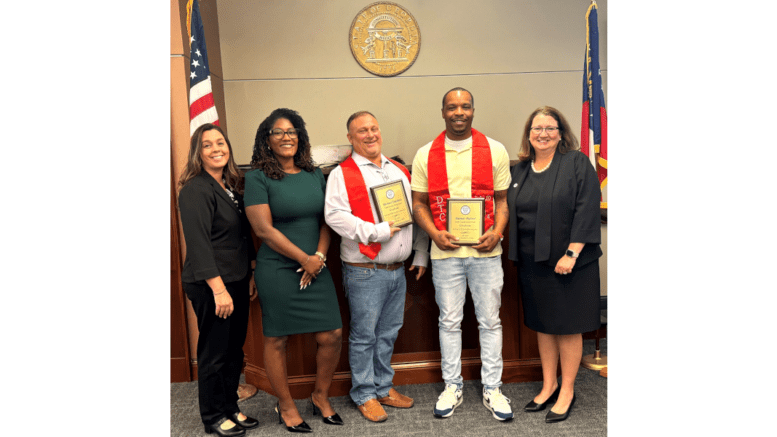Photo provided by Cobb County
The Cobb County Drug Treatment Court celebrated two new graduates.
This accountability court is set up to provide an alternative to incarceration for people with substance abuse issues whose crimes are best addressed by counseling and treatment rather than punitive measures.
According to the press release from the county:
Judges, elected officials, community members, court staff, attorneys, family members, and friends packed the Cobb Superior Court Jury Assembly Room to congratulate the two newest Cobb County Drug Treatment Court graduates. The graduates, staff, family, and friends shared moments of tears and laughter as they detailed their journey. The overriding theme was a sense of accomplishment, hope, and excitement for the next chapter of their lives.
The program lasts 18 to 24 months and “uses a combination of close supervision, individualized, evidence-based treatment, and recovery support to hold offenders accountable for their actions and teach them to be productive members of the community.”
“Drug Treatment Court has changed my way of thinking to allow me to make better choices, stay sober, and move forward with my life to be a productive member of society,” said one of the graduates.
Superior Court Judge Kimberly A. Childs presides over the Drug Treatment Court.
After the graduation ceremony, she said, “these graduates exemplify the need for and importance of an evidence-based recovery and treatment program in our criminal justice system.”
“Our community should be proud of the commitment Cobb County has to helping those with substance use disorder transform their lives,” Childs said. “Through our dedicated team’s efforts and our stakeholders’ continued efforts, these six graduates are now sober, independent, and productive members of our society.”
About the Accountability Courts
Materials distributed by Cobb County Superior Court describe Cobb’s four accountability courts as follows:
“Cobb Superior Court has four such courts: Drug Treatment Court, which includes both regular and intermediate tracks; Veterans Accountability and Treatment Court; Mental Health Court; and Parental Accountability Court. Various county and state offices collaborate with the judges and staff in operating individual accountability courts.”
The purpose of the accountability court program is to provide an alternative to incarceration for individuals who need counseling and treatment rather than punishment.
Drug Treatment Court
The website for the Drug Treat Court describes the program and its two tracks as follows:
“Drug Treatment Court is an accountability court designed to manage individuals with substance addiction by providing an alternative to the traditional justice system.
“The Court Is designed to improve the health of our participants, not only by addressing the immediate symptoms of their addiction but also orienting participants to a new way of healthier living which can be continued for the rest of their life.
“The Cobb County Drug Treatment Court offers two programs.
“The regular track is an 18- to 24-month program, dealing with high-risk, high-need participants.
“The Intermediate track is a 12- to 18-month program for participants diagnosed with a mild to moderate substance use disorder and deemed a lower risk of re-offending. A risk-needs-responsivity assessment is completed to determine participant placement.”
Mental Health Court
The website for the Mental Health Court describes that court and its mission as follows:
“Mental Health Court is a 24 month minimum, voluntary, pre or post-plea, judicially supervised, treatment-based program for those individuals with a documented mental health diagnosis.
“The Cobb County Mental Health Court strives to improve mental health, promote self sufficiency, reduce recidivism, and offer cost effective alternatives to incarceration and hospitalization.
“A Mental Health Court represents an effort to increase effective cooperation between two systems that have traditionally not worked closely together – The Mental Health System and The Criminal Justice System.
“The program will hold participants accountable while assisting them in achieving long term stability, becoming successful family/community members, and remain law abiding citizens.”
Veterans Accountability and Treatment Court
The Veterans Accountability and Treatment Court website describes that court as follows:
“Cobb County Veterans Accountability and Treatment Court (VATC) seeks to divert eligible veteran defendants with substance dependency and/or mental illness that are charged with criminal offenses, to a specialized criminal court.
“The court substitutes a treatment problem solving model for traditional court processing.
“The veterans voluntarily participate in a judicially supervised treatment plan that a team of court staff, veteran health care professionals, veteran peer mentors, and health care professionals develop with the veteran.
“At regular status hearings, treatment plans and other conditions are periodically reviewed for appropriateness, incentives are offered to reward adherence to court conditions, and sanctions for non-adherence are handed down.”
Parental Accountability Court
The website for the Parental Accountability Court describes its purpose as follows:
“PAC seeks to address underlying issues that make it difficult for non-custodial parents to pay child support while providing judges with an alternative to incarceration in civil contempt cases.
“The program uses a team approach to meet participants’ needs as they become more accountable for supporting their children.
“Members of the Parental Accountability Court Team include the Judge, Special Assistant Attorney General (SAAG), Parental Accountability Court Coordinator (PAC-C) from the Georgia Department of Human Services (DHS), Division of Child Support Services (DCSS), DCSS local Office Manager, and representative(s) from the Cobb County Community Services Board (CSB).”
For more detailed information about the accountability courts visit this link to the Superior Court’s Accountability Court website and explore the specific programs you are interested in learning about.
